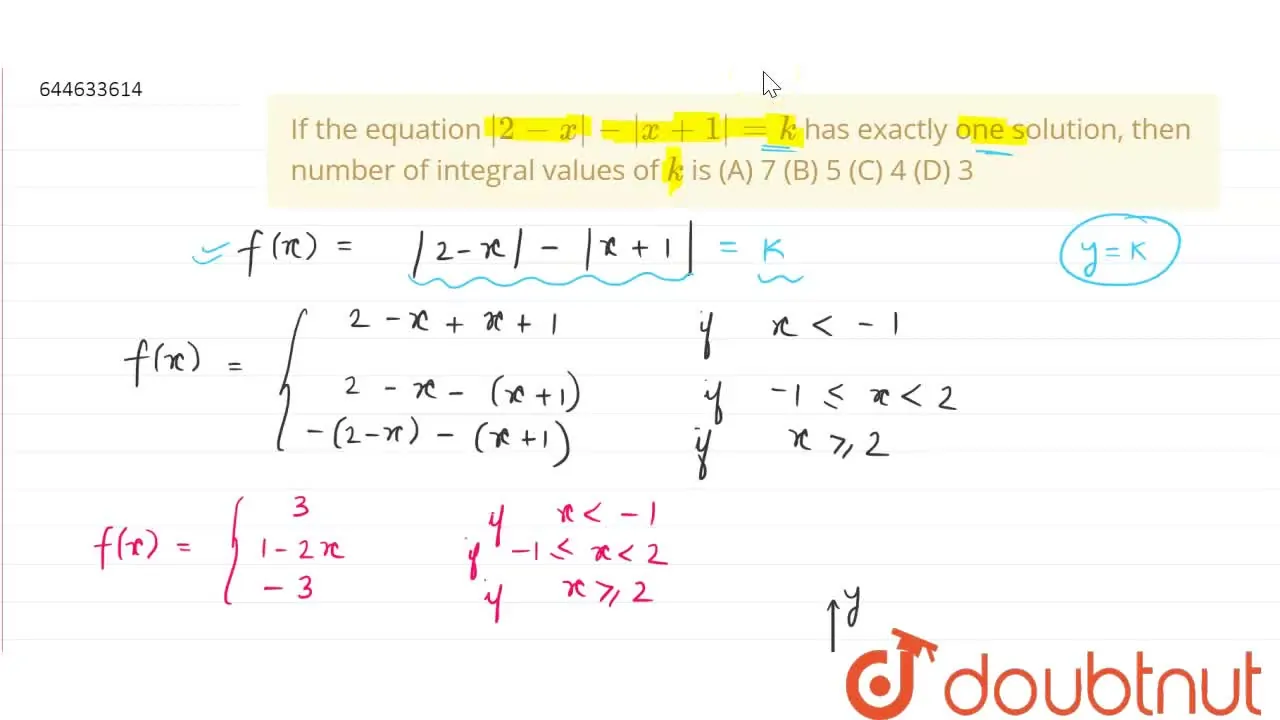If the equation |2−x|−|x+1|=k has exactly one solution, then number of integral values of k is (A) 7 (B) 5 (C) 4 (D) 3
7
5
4
3
The correct Answer is:B
Let f(x) = |x - 2| - |x +1|= ⎧⎪⎨⎪⎩3,x<−1−2x+1,−1≤x≤2−3,x>2<br><imga≤ocr_imageload∈g=lazysrc=https://d10lpgp6xz60nq.cloudfront.net/physics_images/VMC_JEE_REV_TST_26_E03_018_S01.pngwh=80%mx-autosty≤=background:white;><br>So,kin (-3,3)<br>therefore k_(integers) = -2 , -1 , 0 , 1, 2
Related Playlists
- BOOK - VMC MODULES ENGLISHCHAPTER - JEE MAIN REVISION TEST - 26 (2020)EXERCISE - MATHEMATICS ( SECTION 2)5videos
JEE MAIN REVISION TEST - 26 (2020)
- BOOK - VMC MODULES ENGLISHCHAPTER - JEE MAIN REVISION TEST - 25 | JEE - 2020EXERCISE - MATHEMATICS25videos
JEE MAIN REVISION TEST - 25 | JEE - 2020
- BOOK - VMC MODULES ENGLISHCHAPTER - JEE MAIN REVISION TEST - 27 - JEE -2020EXERCISE - MATHEMATICS (SECTION 2)5videos
JEE MAIN REVISION TEST - 27 - JEE -2020
Similar Questions
If the equation ln (x2+5x)−ln(x+a+3)=0 has exactly one solution for x, then possible integral value of a is:
View SolutionIf the equation ln (x2+5x)−ln(x+a+3)=0 has exactly one solution for x, then possible integral value of a is:
View SolutionLet f(x)=x+2|x+1|+x−1∣.Iff(x)=k has exactly one real solution, then the value of k is 3 (b) 0 (c) 1 (d) 2
View SolutionLet f(x)=x+2|x+1|+2|x−1|. If f(x)=k has exactly one real solution, then the value of k is (a)3 (b) 0 (c)1 (d) 2
View SolutionIf the equation x4+kx2+k=0 has exactly two distinct real roots, then the smallest integral value of |k| is:
View SolutionThe number of integral solutions of x+2x2+1>12 is (A) 4 (B) 5 (C) 3 (D) 2 (E) 6
View SolutionIf the equation xlogax2=xk−2ak,a≠0has exactly one solution for x, then the value of k is/are
View SolutionIf the system of equation r2+s2=t and r+s+t=k−32 has exactly one real solution, then the value of k is
View SolutionIf 5x2−2kx+1<0 has exactly one integral solution which is 1 then sum of all positive integral values of k.
View SolutionIf xn−1 is divisible by x−k then the least positive integral value of k is(a) 1 (b) 2 (c) 3 (d) 4
View Solution


